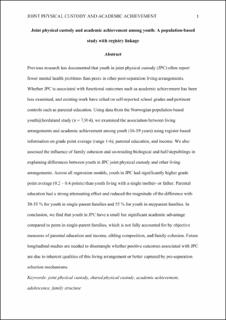| dc.contributor.author | Nilsen, Sondre Aasen | |
| dc.contributor.author | Askeland, Kristin Gärtner | |
| dc.contributor.author | Bøe, Tormod | |
| dc.contributor.author | Sivertsen, Børge | |
| dc.contributor.author | Heradstveit, Ove | |
| dc.contributor.author | Hysing, Mari | |
| dc.date.accessioned | 2023-01-25T10:36:56Z | |
| dc.date.available | 2023-01-25T10:36:56Z | |
| dc.date.created | 2022-07-30T18:06:33Z | |
| dc.date.issued | 2022 | |
| dc.identifier.issn | 0893-3200 | |
| dc.identifier.uri | https://hdl.handle.net/11250/3046197 | |
| dc.description.abstract | Previous research has documented that youth in joint physical custody (JPC) often report fewer mental health problems than peers in other post separation living arrangements. Whether JPC is associated with functional outcomes such as academic achievement has been less examined, and existing work has relied on self-reported school grades and pertinent controls such as parental education. Using data from the Norwegian population-based youth@hordaland study (n=7,914), we examined the association between living arrangements and academic achievement among youth (16–19 years) using register-based information on grade point average (GPA; range: 1–6), parental education, and income. We also assessed the influence of family cohesion and coresiding biological and half/stepsiblings in explaining differences between youth in JPC and other living arrangements. Across all regression models, youth in JPC had significantly higher GPA (0.2–0.4 points) than youth living with a single mother or father. Parental education had a strong attenuating effect and reduced the magnitude of the difference with 30%–35% for youth in single-parent families and 55% for youth in stepparent families. In conclusion, we find that youth in JPC have a small but significant academic advantage compared to peers in single-parent families, which is not fully accounted for by objective measures of parental education and income, sibling composition, and family cohesion. Future longitudinal studies are needed to disentangle whether positive outcomes associated with JPC are due to inherent qualities of this living arrangement or better captured by preseparation selection mechanisms. | |
| dc.description.abstract | Joint Physical Custody and Academic Achievement Among Youth: A Population-Based Study With Registry Linkage | |
| dc.language.iso | eng | |
| dc.subject | Familieliv, foreldreskap og omsorg for barn | |
| dc.subject | Familylife, parenting, child-care | |
| dc.subject | Skoleprestasjoner | |
| dc.subject | Educational outcome | |
| dc.subject | Familieomsorg | |
| dc.subject | Informal care | |
| dc.title | Joint Physical Custody and Academic Achievement Among Youth: A Population-Based Study With Registry Linkage | |
| dc.title.alternative | Joint Physical Custody and Academic Achievement Among Youth: A Population-Based Study With Registry Linkage | |
| dc.type | Peer reviewed | |
| dc.type | Journal article | |
| dc.description.version | submittedVersion | |
| dc.subject.nsi | VDP::Utviklingspsykologi: 265 | |
| dc.subject.nsi | VDP::Developmental psychology: 265 | |
| dc.subject.nsi | VDP::Utviklingspsykologi: 265 | |
| dc.subject.nsi | VDP::Developmental psychology: 265 | |
| dc.source.journal | Journal of Family Psychology | |
| dc.identifier.doi | 10.1037/fam0001015 | |
| dc.identifier.cristin | 2040154 | |
| cristin.ispublished | true | |
| cristin.fulltext | preprint | |
| cristin.qualitycode | 1 | |
